Retail is one of the core industries in the world. It provides people with groceries, clothing, and other goods. As with any other industry, it is subject to changes due to technological advancements and global market shifts.
According to the NVIDIA survey, 98% of retailers are planning to invest in generative AI models over the next 18 months. And no wonder – who could say no to its benefits? Personalized suggestions based on customer data, supply chain management, improved customer loyalty, and inventory management are all powered by generative AI.
Today, we will explore how this technology affects the industry and how you as a retailer can benefit from adopting AI.
Understanding Generative AI for Retailers
Generative AI is a subset of artificial intelligence. It can generate new content based on the information it was trained on. Unlike some other AI-based solutions that are constrained to perform one specific task, these models can perform multiple tasks as long as they have data to learn from.
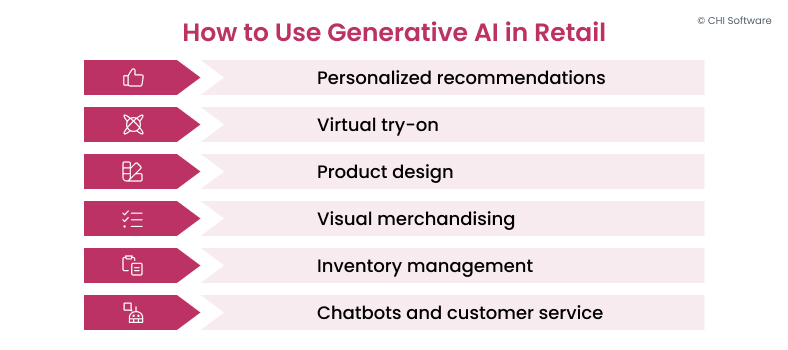
To put labels on the abilities, let’s talk about what generative AI models can do for retailers.
- Personalized recommendations: Ever wondered how store recommendations always know what to offer? That’s the work of generative AI. It tracks customer data regarding previous purchases and provides recommendations based on that. It’s very useful from a customer perspective since it saves time looking for what they need. At the same time, higher convenience increases customer loyalty, which benefits your business. A win-win situation!
- Virtual try-on: For many customers, buying clothes or accessories online is a chore. Since you can’t see how good the item fits you (or looks on you), there is room for inconveniences, such as returning items that didn’t fit and demanding money back. That’s the problem of the past now! Generative artificial intelligence can help visualize the product on a person, saving a lot of time and shipping fees for both businesses and their customers.
- Product design: The information era came to us with its benefits and trade-offs. One of those trade-offs is how fast market trends change. Luckily, generative AI can help you keep up with the fast pace of change. By inputting a bunch of parameters such as style, functionality, and material, you will get a new, trendy, and unique product. This will help you stay competitive in any market conditions.
What should you consider before implementing AI? Here are some tips and hints from our team.
Continue reading
- Visual merchandising: When discussing the retail industry, one problem people don’t cover enough is product placement. But you can’t ignore it since it is crucial for customer engagement and convenience. Generative AI can help with that. It visualizes a store layout and the optimal placement of goods.
- Inventory management: For retailers, going out of stock usually means losing your customers to competitors. That’s less than optimal, especially during festive seasons. To prevent this, generative AI can manage the supply chain and keep track of stock, alerting you when your stock goes low. On top of that, it can analyze sales data to accurately detect demand patterns and market trends. This ensures you will never go out of stock and significantly improve inventory management.
- Chatbots and customer service: Customer service is an important job, but it is very soul-draining as well. So, why not optimize it? By adding a conversational AI in the form of a Q&A chatbot to your store, you lower the need for human customer service representatives. Such chatbots can provide personalized customer experiences by finding products, placing orders, and answering questions.
As you can see, generative AI models in retail bring a lot of value. However, you need experts in the field to utilize it for your business. We at CHI Software are proficient in Generative AI consulting and development of such solutions for retailers.
Now that we know how it works, let’s talk about use cases of generative AI in retail.
8 Use Cases of Generative AI in Retail
There are hundreds of generative AI use cases in retail worldwide. We have picked the most interesting ones for you here.
Let’s Put it on eBay: AI-Powered Listings
eBay is one of the oldest platforms for people to buy and sell goods. Founded in 1995, this US company grew into 190 markets worldwide. To this day, the platform stays relevant, making around 10 billion USD in 2023.
In last September, they introduced new features powered by Generative AI:
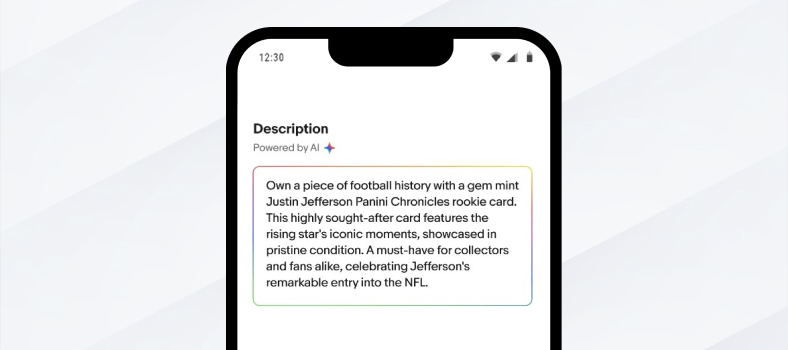
Source
- AI-generated item descriptions: Platform users get a product description that will grab the attention of their potential customers with just a click of a button. Sellers can use those descriptions as is or tweak them a bit to fit the business’ tone of voice.
- Background removal tool: This feature already existed in some form, but now it is powered by AI to provide better results. It works the same way as generating an item description: users click the button and get a clean, transparent background instead of the old one. Easy!
- Improved listing: On most e-commerce platforms, when users want to sell an item, they need to type in its name, description, and parameters. eBay decided to simplify this process. All sellers need to do is provide a small amount of data to their AI assistant. After that, AI will analyze, research, and extrapolate the required information from the seller’s data. Users just take a photo of the item they want to sell and upload it. That’s it – leave content creation to AI!
According to eBay’s research, around 95% of people who used new AI-powered features kept using them in the future. At the same time, customer satisfaction grew to 80%.
Achieving Success with Generative AI: The Story of Walmart
Walmart is another retail corporation from the USA. It specializes in selling goods through a network of hypermarkets, department, and grocery stores. With over 10,000 places in 24 countries, Walmart’s revenue was 611 billion USD in 2023.
Nowadays, you can’t earn such groundbreaking profits by operating “the old way”. Walmart has always been the pioneer in adopting new technologies, so it’s no wonder they are our next example of generative AI in retail.
- AI-powered shopping: Some people may be overwhelmed when they are presented with more than two choices. Let’s say a customer wants to stock up on food but can’t decide what bread to buy since there are around ten different brands with different tastes. Now they can just go to Walmart’s website or use their app, type in “I want to buy bread that will go with peanut butter and jelly the best,” and an AI-powered search bar will provide them with the most suitable option.
- Associate assistant: Walmart has a chain of associate stores. To help them with tedious tasks, Walmart introduced the “My Assistant” app. This generative AI-powered solution helps associate stores with documentation, speeds up the drafting process, and helps as a creative partner. It can also track competitor price movements and help out with inventory management. This allows associate stores to focus on business improvements instead of routine store maintenance.
- In-store chatbot: Not only online customers and associate stores benefit from generative AI features. For in-store shopping, Walmart has a generative AI called “Ask Sam”. This chatbot can help visitors find items, look up prices, and answer FAQs.
All of these features combined improve customer experience online and offline. On top of that, they make Walmart’s associates more efficient in their operations.
How to make your AI chatbot secure? Our engineers have a few tips for you.
Read more
Beauty in Generative AI: CHI Software case
There’s hardly a limit of AI use cases in e-commerce. Here’s our experience we’d like to share.
Our client from America is in the beauty and cosmetic sector of the retail industry. They were considering ways to improve customer experience, retention, and inventory management. So, we presented them with a solution that does just that.
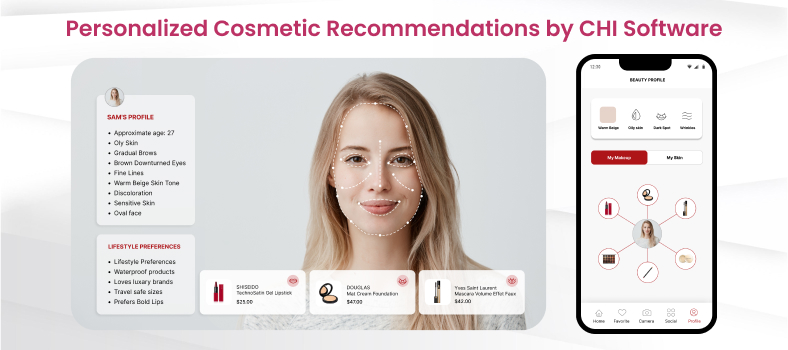
Our team has created a generative AI-powered app that utilizes a recommendation system tailored to each user and a chatbot consultant who can reply to FAQs. Let’s look at those two features more closely:
- Recommendation system: Each user receives personalized recommendations for skincare products based on facial analysis. Users may be prompted to input their cosmetics preferences when navigating through the app’s recommendations section. After that, AI generates a list of products that would fit the user best.
- Chatbot consultant: To improve customer service, we introduced an AI chatbot supporting the client 24/7 and tailor product recommendations based on individual preferences. All of this combined reduces operational costs for business.
What are other ways to use AI in e-commerce? We have 15 more ideas!
Read more
We have seen the fruits of our labor in some of the client’s data. The AI-powered app effectively increased customer satisfaction and loyalty, improved customer retention, and opened valuable insights for business.
For example, the client reduced the stockouts because the system allows our client to see which products will potentially go out of stock.
To read more about this project, click here.
Carrefour: Generative AI Pioneer from France
Another case of generative AI in retail comes from Carrefour. This French business operates in over 30 countries and specializes in wholesale. It is the seventh-largest retailer in the world, with revenue of 91 billion USD in 2023.
Last year, they decided to start leveraging generative AI and already announced new features.

Source
- Advisor: in June 2023, the brand introduced a new conversational AI. It helps customers choose products based on their budget and food constraints. It can even give customers ideas for meals and anti-waste options based on reused ingredients. It also composes associated recipes and baskets.
- Smart descriptions: However, Carrefour didn’t stop there. To improve the online shopping experience, they have utilized generative AI. Now it’s responsible for creating detailed item descriptions providing customers with more information and helping them pick the right item.
- AI support: The two features above were targeted mostly at customers, but the retailer has also developed an AI tool for internal use. It helps with purchasing processes and drafts invitations to tenders.
These features might look small for some people, but their impact cannot be overstated. From enhanced online shopping experience to streamlined internal processes, generative AI in retail pushes businesses to new heights.
Too Long to Read: Newegg’s Review Summaries
Newegg is an American online retailer that specializes in computer hardware and other consumer electronics. It’s a small business compared to those we have covered before. However, their example shows that you don’t need to be a multi-billion corporation to leverage the power of generative AI in retail.
According to Newegg’s statistics, only 20% of their customers read reviews. With AI’s introduction, this problem is easily mitigated.

Source
Picture this: your customer wants to buy new headphones. They go to the online shop to look for the item they want. When they find it, they see hundreds of reviews. This is where the problem begins. While the reviews are helpful, not every customer will read them, which could lead to lower customer satisfaction.
Newegg thought the same, so they introduced a review summarization solution powered by ChatGPT to their website. It analyzes the item’s reviews and extracts key terms and phrases to generate coherent summaries. The summaries are then grouped and shown on the item page.
This example shows that you don’t have to be one of the biggest companies in the retail industry to leverage AI and the potential of ChatGPT for retail.
May I Suggest: Mercari and Generative AI
Mercari is a Japanese e-commerce company, which is also the biggest community marketplace and the first startup in Japan to reach unicorn status.
Recently, Mercari has decided to improve its services by adopting generative artificial intelligence. As a result, they introduced a personalized advisor within their existing app.
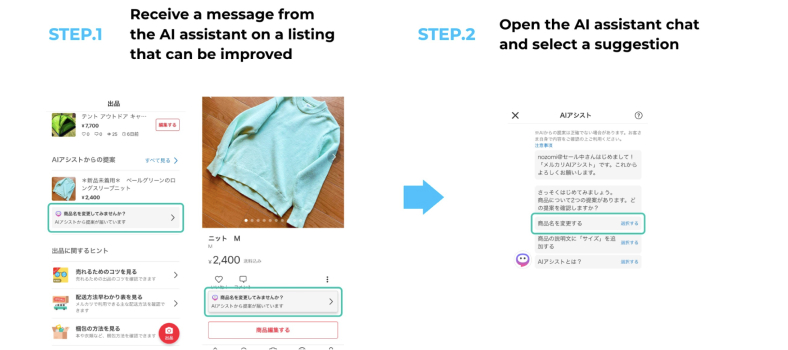
Source
Mercari AI Assistant helps sellers reach their buyers. If an item has not been sold in a certain amount of time, the assistant will suggest ways the seller can improve the listing. Such suggestions are based on previous sales data of similar listings. Moreover, the AI-powered tool can generate eye-catching names for items that are sure to grab buyers’ attention.
This assistant is relatively new. It was announced in October 2023 with plans to add more advanced features in the near future.
Generative AI Is the Beef: Wendy’s Recent AI Adoption
One of the retail sectors we haven’t covered yet is fast food. That’s where Wendy’s comes in. It’s a chain from the USA with 2 billion USD in revenue over 2023.
As with any other business, they are constantly on the lookout for new ways to improve customer experience and company profit. That’s why they announced a partnership with Google Cloud in late 2023. The result? A new generative AI solution for drive-thrus.

Source
Most restaurant chains’ attempts to adopt traditional AI end up being very “mechanical.” This means you can order food and get personalized recommendations, but such tools can’t maintain a casual conversation.
Generative AI, however, is proficient in text creation and, if trained, can keep up the conversation. Thus, it helps Wendy’s provide responsive service to every customer without sacrificing the overall quality.
This solution is in the last stages of live testing in Columbus, Ohio, with plans to expand to all locations around America.
Work Hard. Have Fun. Make Generative AI: Amazon’s Case
It’s hardly possible to talk about the retail industry and not mention the elephant in the room – Amazon. Being part of the American “Big Five,” it’s not surprising they’re interested in generative AI in retail as well.
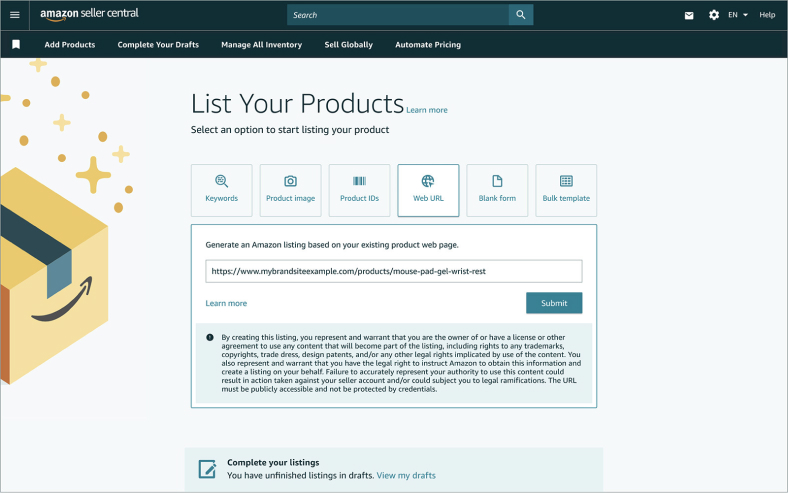
Source
Amazon aims to make the process of setting up product listings as easy as possible and help customers find what they want. Let’s cover some of the steps they recently took to achieve that.
Stage 1. They allow sellers to list items with just a few words of description. Next, generative AI would do the job of creating compelling titles, product descriptions, and other details.
Stage 2. The process was simplified after that. This time, all sellers needed was a product photo.
Stage3. Now, the process has become even more straightforward. How? The seller provides a URL to the product they want to sell, and Amazon’s internal AI generates a page based on the info from the link.
URL linking is fairly fresh as of March 2024, but it is already available around the U.S. As Vice President Mary Westmoreland wrote, “This [feature] will further enhance and streamline the process of creating product listings, saving our selling partners more time and effort while developing listings for Amazon’s store that appeal to customers and help drive sales.”
Conclusion
The cases we explored are not all examples of generative AI in retail. The list of companies is too extensive, which only makes the message clear: generative AI is the future of this industry, and anyone who wants to utilize it must keep up with AI retail trends.
From chatbots and content creation to inventory and supply chain management, generative artificial intelligence is the best way to elevate your business and customer experience.
Creating your own generative AI solution is no easy task, but luckily, you’re at the right place. We at CHI Software provide generative AI development services. Contact us, and we’ll reach out shortly.
About the author
Alex Shatalov
Data Scientist & ML Engineer
Alex is a Data Scientist & ML Engineer with an NLP specialization. He is passionate about AI-related technologies, fond of science, and participated in many international scientific conferences.










